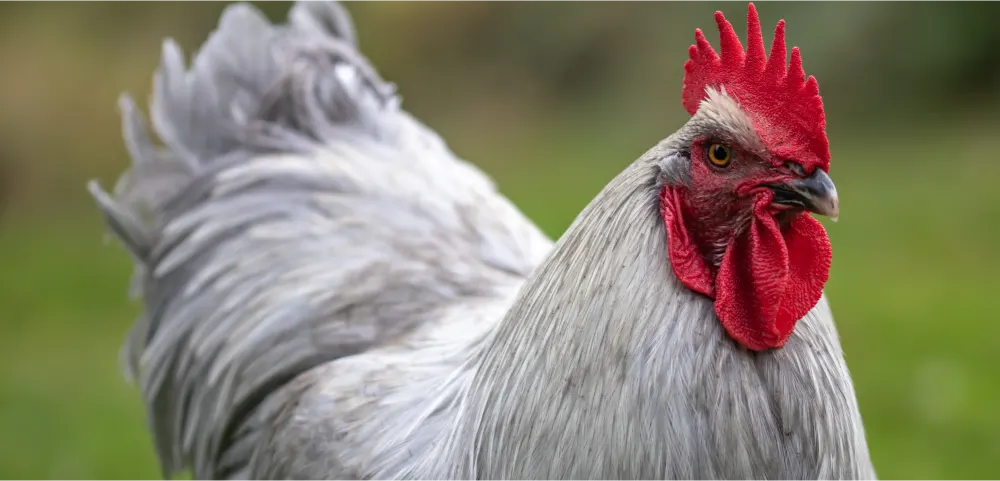Treating Chickens with Open Sores
Treating a chicken's open sores requires the best wound and skin care product. Chickens in a flock are prone to open sores. Spending a good deal of time pecking the ground for food, they often peck each other. This constant pecking with sharp beaks can lead to a painful, irritating chicken wound. Chickens or roosters fighting with their spurs can inflict immense damage on themselves and each other. Additionally, a virus called fowlpox can lead to wet or dry sores and poor chicken health. In this article, we'll examine these chicken sores and how to bring relief using a new, all-natural animal wound care spray.
Treating Chickens With Pecking Sores
One of the more common causes of open sores on chickens is pecking from other chickens. Chickens do this naturally, and a few pecks at another bird are often harmless. But when a chicken becomes aggressive and pecks incessantly, causing cuts and bleeding, it’s important to remove the offending bird from a shared pen and to treat the chicken sores before they become infected.
A chicken that has been cut should be isolated in order to address the injury and to reduce stress on the animal. If the open sore(s) is small and can be closed, simply clean the open sores with a wound care spray like Clireon, which is all-natural and gentle enough to use on any type of chicken cut or sore. Here are the steps to take:
- Remove any hair from the sore area. This includes feathers and other fine hairs if present.
- Apply Clireon directly onto the wound. Continue applying Clireon until clean. No rinsing is necessary.
- If applying a dressing, soak the dressing in Clireon. Apply the dressing directly over the open chicken wound with the edges of the dressing extending beyond the sore's margins.
- Repeat up to five times each day as needed. Add Clireon for help removing stuck-on dressings.
Treating Painful Lesions For Chickens With Fowlpox
Fowlpox is a viral disease that produces lesions on unfeathered skin or the mucus membranes in the throat. Fowlpox is caused by the avian pox virus, and there are two forms: wet and dry. The wet variety is more lethal, though the disease is seldom fatal in any case, and affects the throat and respiratory tract. The dry type affects the head, legs, and feet with irritating, pus-filled blisters, causing your chicken pain. Spraying each blistery chicken bump with Clireon can help manage the symptoms while preventing infection as the pox blisters harden and fall off on their own.
Treating Spur-Wounds On Chickens
Roosters have spurs, and they use them to fight over available hens and defend against predators. In order to treat a chicken's open sores and wounds caused by spurs, we need to understand biofilm.
A biofilm is an extremely thin layer of bacteria that adheres to a surface — in this case, the open chicken wound. Biofilms self-protect by forming an extracellular polymeric substance, or EPS. Not every cleaning agent or antibacterial spray can penetrate this barrier and kill the bacteria.
To best care for your chicken's wound, first inspect it to see if it requires veterinary care. If not, begin with a thorough cleaning using large amounts of an antimicrobial agent like Clireon. Clireon's unique, all-natural formula uses hypochlorous acid as its active ingredient, which may penetrate the EPS and kill the bacteria underneath to support the healing process. Follow the steps above to continue caring for your chicken’s wound. When the wound has healed, reintroduce the bird to the flock.
Hypochlorous Acid — What Is It And Why Does It Work On Chicken Sores?
Hypochlorous acid (HOCl) is produced naturally in a mammal's white blood cells. Its purpose is to battle viruses and bacteria that try to move in, set up a biofilm, and watch infection and inflammation grow. HOCl may penetrate the extracellular polymeric substance and kill the microorganisms living underneath, and because it's produced in white blood cells, it complements a mammal's matrix and DOES NO HARM! HOCl enhances the chicken's natural ability to heal.
Gentle, non-toxic, steroid-free, non-irritating, antibiotic-free hypochlorous acid is an antibacterial that, upon contact with any organic matter such as viruses and bacteria, kills them and deactivates.There's no need to rinse. HOCl is safe to use around eyes, ears, nose and mouth and would be harmless if accidentally ingested. Because it contains no harsh chemicals, HOCl is safe for the environment.
Clireon Contains Hypochlorous Acid
Chickens in need of relief from painful open sores need the power of nature found in HOCl, the active ingredient in Clireon. Clireon helps manage irritation as a pet wound care agent for other animals, too. Clireon’s many benefits include the following:
- Cleansing Open Sores
- Irrigating Wounds
- Debriding Tissue
- Moisturizing Wounds
- Minimizing Complications
- And Many More
Get Clireon To Provide The Relief Your Chickens Need
With Clireon, you'll be ready to tackle open sores and other wounds your chickens may suffer. Chicken health is always a peck, pox, or spur away from needing a safe, reliable, powerful, and all-natural way to bring relief and support their body's healing process. With the force of Mother Nature found in HOCl, Clireon is the first choice when the inevitable happens. If you'd like more information, please reach out to us; we'd love to hear from you!


